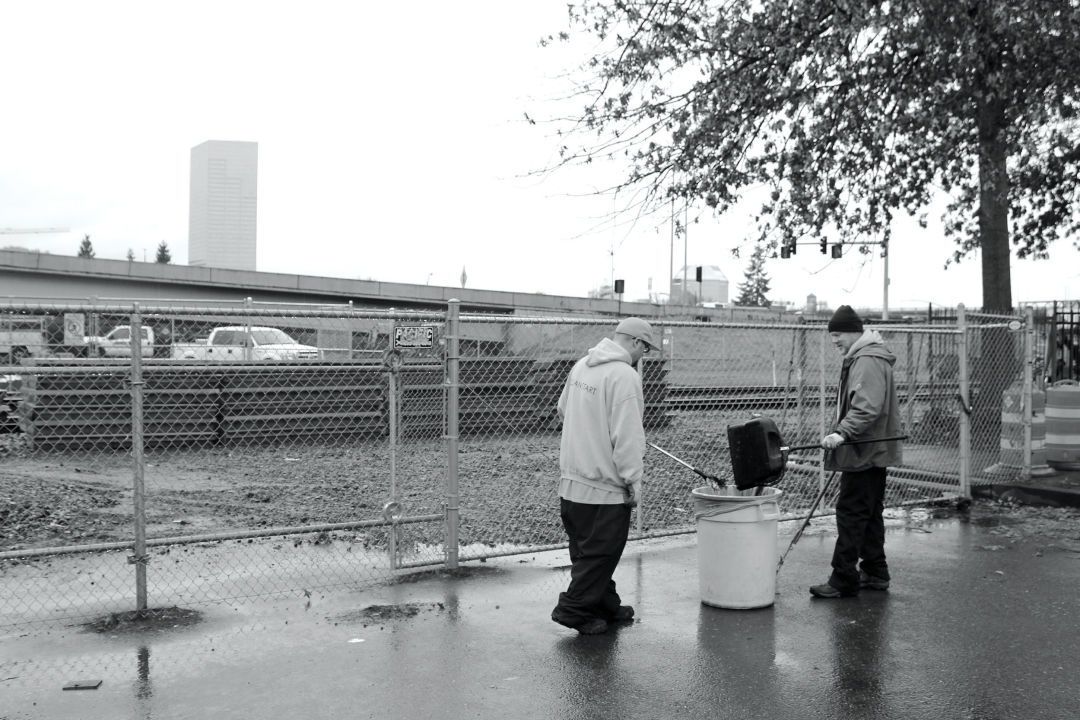These Are the People Cleaning Up Portland's Homeless Encampments

Image: Courtesy Clean Start
By 9:45 a.m., Clean Start’s David Brandon and trainee Corey Center had already collected 40-some bags of trash and 28 spent needles.
Brandon pulled a truck into a garage on SW Alder, dropped off a trailer piled high with garbage, and leafed through his remaining “track-its” for the day: reports of a string of sidewalk tents at SE Eighth and Alder, a large tarped structure near an Orange Line MAX stop, and piles of abandoned items. The pair had seven more stops to make that day, as first responders for complaint calls logged with the city’s Homelessness/Urban Camping Impact Reduction
Program (HUCIRP).
Brandon and Center are uniquely qualified for the job. Both have lived on the streets themselves, and both are in recovery for substance abuse. That tracks for most of Clean Start’s 60-some workers.
“The majority of the people we hire have lived experience with houselessness,” says Jay McIntyre, business director for Clean Start, just one of several homelessness-fighting programs at Portland nonprofit Central City Concern.
Clean Start is that rare official response to crisis that contains, within itself, the kernel of a solution: jobs for people in recovery, transitioning from the streets, and/or adjusting to life after prison. Most employees come up through CCC’s Community Volunteer Corps: a three-month volunteer program that aims to (re)orient enrollees to time cards, working under supervisors, and other skills. If they land a position training with Clean Start, they’ll find themselves on “initiated clean-ups,” where employees make contact with campers, remove items, and distribute trash bags for pick-up. Each site check results in an assessment that assigns points for “risks” like the number of structures, proximity to schools, and presence of drug paraphernalia. With enough points, an encampment is flagged for clean-out.
None of this would go smoothly without empathy. It’s worth noting that Clean Start employees have often survived struggles not experienced by the callers whose complaints they address. These experiences, Brandon and Center say, allow them to connect with campers, and sometimes help with longer-term solutions—refer them to recovery programs and social services, or just show, by their own example, that it’s possible to leave the streets.
The need for positive solutions has never been stronger. Take those peeved callers: the first three months of 2019 saw calls resulting in 2,436 “track-its.” Since the city-contracted program launched in 2015, Clean Start employees have physically answered more than 25,000 of those reports on behalf of Portland and other parts of Multnomah County, according to HUCIRP. (CCC’s nonmotorized Clean & Safe program is tasked specifically with cleaning 213 downtown city blocks, while Clean Start trucks answer camper calls throughout the city and as far east as Gresham.)
Later that April morning, Brandon and Center visited a tarped structure on a street near OMSI. The occupant, a young woman who gave the name Roxy, knew the Clean Start truck from prior visits; she handed over several garbage bags, some propane tanks, and a busted pallet.
Back in the truck, Brandon filled out his assessment, noting that a fire pit (“an environmental impact”) would add to Roxy’s point tally for eventual camp clean-out. “She knows,” Brandon said. Until then, Clean Start’s visits would serve as one more lifeline to services, if she needed them.
“We’re finally making a difference,” Brandon says. He hopes people see Clean Start’s work as more than functional—it can help heal a divided city.
“We get thank yous from people,” Center says. The most heartfelt feedback, he adds, is from the campers themselves. “They come up to us and say, ‘Thank you for treating us like human beings.’”




